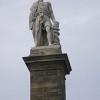Collingwood 2010 Festival
“Now, gentlemen, let us do something today which the world may talk of hereafter.” (1805 prior to the Battle of Trafalgar.)
Vice-Admiral Lord Cuthbert Collingwood, was Born in Newcastle, September 26, 1750 and died on March 7, 1810. Next week marks the 200th anniversary of his death, the date being marked by a remembrance festival involving the ceremonial firing of the cannons which now lie at the foot of Collingwood’s monument overlooking the Tyne at Tynemouth, and which were last fired at the Battle of Trafalgar.
Now let’s not dismiss too lightly this guy’s not insubstantial part in our history. He went to sea aged 13. Aged 24 he sailed to Boston, with Admiral Sam Graves, where he fought in the Battle of Bunker Hill. 3 years later he first met Nelson when they served together on HMS Lowestoffe. He spent 3 years in the West Indies, with Nelson, under his own command, protecting British trade routes from the Americans.
After a period back home in his beloved Morpeth, Collingwood married in 1791. Such was Collingwood’s commitment to the Royal Navy’s that he planted acorns at every opportunity to boost future stocks of timber for British ships. He returned to sea in 1793 blockading the assembled French and Spanish forces in the Mediterranean. In 1803 when hostilities with the French resumed, he left home never to return.
As Vice Admiral, second in command to Nelson, aboard the Royal Sovereign he fired the first shot at Trafalgar, in 1805 and when Nelson was mortally wounded he took over command of the entire British fleet resulting in victory over the combined forces attempted invasion of Britain. Had the Royal Navy lost the battle, Napoleon with his 115,000 troops based at Boulogne, would have swept across the channel and invaded England.
After Trafalgar, despite his repeated requests to be relieved of his command and return to his home and family, due to failing health. Collingwood was posted to the Mediterranean, as a strategic, political and diplomatic figure head for Britain.
He died of cancer, at sea, on the 7th March 1810 aboard the HMS Ville de Paris, ironically heading back to Britain after being away for seven years.
More information about the Collingwood2010 festival here.
By Dave on February 23, 2010
Check out all the pics
Sorry, the comment form is closed at this time.
Back issues
- August 2018
- July 2018
- November 2016
- August 2016
- July 2016
- June 2016
- May 2016
- March 2016
- February 2016
- January 2016
- December 2015
- September 2015
- August 2015
- July 2015
- June 2015
- May 2015
- April 2015
- March 2015
- February 2015
- January 2015
- December 2014
- November 2014
- October 2014
- August 2014
- July 2014
- June 2014
- May 2014
- April 2014
- March 2014
- February 2014
- January 2014
- December 2013
- November 2013
- October 2013
- August 2013
- July 2013
- June 2013
- May 2013
- April 2013
- March 2013
- February 2013
- January 2013
- December 2012
- November 2012
- October 2012
- September 2012
- August 2012
- July 2012
- June 2012
- May 2012
- April 2012
- March 2012
- February 2012
- January 2012
- December 2011
- November 2011
- October 2011
- September 2011
- August 2011
- July 2011
- June 2011
- May 2011
- April 2011
- March 2011
- February 2011
- January 2011
- December 2010
- November 2010
- October 2010
- September 2010
- August 2010
- July 2010
- June 2010
- May 2010
- April 2010
- March 2010
- February 2010
- January 2010
- December 2009
- November 2009
- October 2009
About us
© The Northern Line 2025 | v159
An Aeroplanes design.








